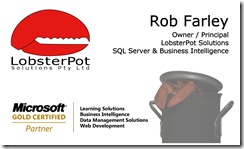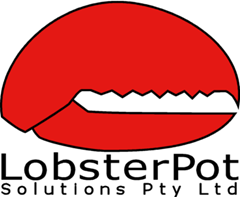I get this question a lot.
I don’t mean just ‘every so often’, I mean all the time. It would average out to daily, but there are still days when I only see people who have already asked. Either way, it’s definitely a lot. And they always put it the same way: “One other thing: Why ‘LobsterPot’?”
For me, it’s all a question of branding, which fits in nicely with Jen McCown’s new “Un-SQL” blog theme, explaining the image I’ve put here to the right.  I’ll talk about the LobsterPot logo in a few paragraphs’ time.
I’ll talk about the LobsterPot logo in a few paragraphs’ time.
At LobsterPot Solutions, we don’t have salespeople. None at all. Instead, we rely on word-of-mouth marketing – people telling each other about us, about how we’ve helped them, are good value-for-money, approachable, knowledgeable, and so on. That means making sure that all our staff (currently five of us) understand the values of the company and represent the company accordingly.
But still, the idea of branding is still something that takes some effort.
Before I go too far into this, I should point out that I’ve had conversations with at least one company about LobsterPot’s branding, and how to leverage this better, through press-releases, advertising campaigns and the like – but I’m going to write about the name, logo, and how I’m trying to differentiate the company brand from my own personal brand.
I wish I had a really good story about a LobsterPot that I could share. Unfortunately, I don’t. I can’t relate some story about some time I was cooking seafood, and forever branded myself with the shape of the pot handle, deciding to name my company after it. Instead, it just comes down to my thinking about brand-names in general.
When people tell me about successful brands, they frequently include Google, Microsoft, and IBM. I had this experience just yesterday even, during an explanation of my branding. These are all successful companies, but I think their brand strength is a reflection of the general company strength, rather than the brand itself being compelling. I can’t deny the two go hand-in-hand, but when considering a start-up, I wanted something to differentiate my company.
I saw four types of company names that I wanted to avoid.
The first type was made-up words. Accenture and Avanade, even Google and Microsoft are all great names once you know the name, but I’m not sure they stick in the mind very quickly. I could tell you about the excellent pain-killer the paramedics used when I had a back-injury in 2003, but I can never remember its name. I just refer to it as the ‘green whistle’, which suggests to me that ‘green whistle’ would make a better brand name than Penthrox (and yes, I just had to look that up).
Another type of branding is the opposite of a made-up word, but rather a word that is so indistinguishable from lots of other brands that it gets lost. A name like Data Solutions is never going to grab me, never going to be able to turn up in a search engine, despite describing the company quite well. Plus, it might not expand too well if the focus of the company shifts away from data.
Third is the dreaded TLA – the three-letter-acronym. IBM is the classic example of this, but there are countless others. I guess there are a limited number of these, but when you start including HP and KPMG, you quickly realise that there are just about as many as you can imagine, and the struggle that these companies must have in being remembered. We might all find that KPMG rolls off the tongue, but if someone told you it was actually KBMG, or KPMC, then you’re relying on the company reputation to remind you. I guess most TLAs have been formed because of company names that begin as either my second brand-type or my fourth, but the brand gets established as the acronym rather than the longer name.
The last kind I wanted to avoid was the “I’ve named the company after myself” scenario. This isn’t so bad on the whole, but I don’t actually want to have a company that can’t be separated from myself. You all know companies that have the person’s name featuring in the brand – shops do it a lot. Almost all the big supermarkets are named after the person that started them, and while this can speak of a personal touch, and a reputation that is attached to an individual, I’m not sure it works so well for a consultancy if I want to be able to send someone else to do a job.
In fact, being able to separate my own branding from the company is something I need to constantly battle. I’m the one who travels to conferences, who received the MVP award, who sits on committees, and so on. Being in Australia, in a different time-zone to where many of the world’s SQL experts live, and being in Adelaide, a city which is disregarded by many Australians even, I can’t ignore my personal brand. If I go somewhere, I want to be larger than life, and deliver a talk that is both educationally jaw-dropping and memorable. I want people to be talking about me after I’ve left the room (hopefully in a nice way too). I can’t be at as many events as many of the SQL celebs (like Jen herself), and I’m asleep when most of them are using Twitter too. I need to be different enough personally to be noticed.
And to be a company (instead of just Rob), I was going to need company branding that ticked a lot of boxes.
I wanted red. I see red as a strong colour, which can help its memorability. Solid red too, not shades of red, or a small amount of red. A large solid block of red, which isn’t devalued by other colours thrown in.
I wanted strong imagery. I wanted people to immediately recognise the words being used, and to have an image come to mind. Hopefully something that would lend itself to a logo.
I wanted strong association and emotion. The imagery that comes to mind should be associated with good feelings, memories of good times.
I thought of companies like egg.com (a financial services company in the UK), Angry Koala (a BI consultancy run by my good friend Grant Paisley, with whom I had a number of conversations around branding), and Banana Blue (an online supermarket). These are all company names that you just remember. They’re ‘funny’, if you like. They all involve a thing, but are slightly more than the thing. It’s the Angriness of the Koala, or the Blueness of the Banana, or the Interwebsicality of the Egg which provides the hook. There’s an absurdity which helps you remember the name.
So one day the Lobster motif occurred to me, and the idea of the Pot, rather than the Lobster itself. Ok, so it doesn’t have the absurdity aspect, but as a company of people, I think the Pot seems to work. Plus, the cooking pot is the delivery mechanism associated with getting Lobster onto your plate, which works.
The Lobster is red. The imagery associated with the claw is strong – it’s easily turned into a logo (and in fact, the logo I use is clearly a logo, not a photo, easily reproduced, minimal number of colours, yet clearly a lobster claw and almost possessing a personality if your imagination can go far enough). When people think of lobsters, they remember the time they were at a fancy restaurant, celebrating some event, or cherishing a loved one, splashing out on some luxury – all emotions I’m more than happy to associate with my business. There’s even a big lobster in South Australia, which helps the connection to where the business is based.
 Okay, so there’s nothing about LobsterPot that suggests business insight or databases (except perhaps the “SELECT Claws"), but I’m not sure that matters. I can wear a bright red shirt which stands out at conferences, and have business cards which even show a lobster in a pot. The name is different enough to make people remember, and perhaps they even spend a moment thinking about if there’s a connection between the business and brand. I do often say “sounds like a restaurant, but isn’t”, which helps people with the imagery, and provide extra hooks for memory.
Okay, so there’s nothing about LobsterPot that suggests business insight or databases (except perhaps the “SELECT Claws"), but I’m not sure that matters. I can wear a bright red shirt which stands out at conferences, and have business cards which even show a lobster in a pot. The name is different enough to make people remember, and perhaps they even spend a moment thinking about if there’s a connection between the business and brand. I do often say “sounds like a restaurant, but isn’t”, which helps people with the imagery, and provide extra hooks for memory.
But most of all, everybody asks.





This Post Has One Comment
I’ve thought about it myself and figured the claw of the lobster could "crunch" the problems of a client 🙂